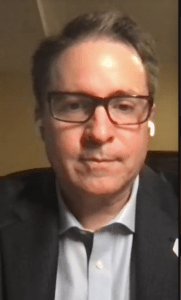The white evangelical inclination to cover up sexual abuse in churches and denominations derives in part from a complementarianism ideology, according to Kristin Kobes Du Mez, author of Jesus and John Wayne: How White Evangelicals Corrupted a Faith and Fractured a Nation.
Such an ideology seeks to protect masculine ministry by forgiving perpetrators, shaming victims and rationalizing sexual aggression as God-given, she said during a June 9 webinar hosted by Public Religion Research Institute.

Kristin Kobes Du Mez
“The idea is that God has filled men with testosterone so they can lead, and they have aggression so that they can protect faith, family and nation and use violence as necessary, and this applies to their sex drives,” said Du Mez, professor of history and gender studies at Calvin University in Grand Rapids, Mich.
Women, meanwhile, are expected to uphold purity ideals and remain silent about abusive behavior while men are cleared to be “very sexually aggressive at times” because, in complementarian thinking, “that’s what you need in a leader.”
Du Mez was joined on the webinar by PRRI founder Robert P. Jones for a discussion of how issues like complementarian theology, Critical Race Theory and racial injustice have influenced the white evangelical movement. The conversation was moderated by Adelle Banks of Religion News Service.
And nowhere is the propensity to deny sexual abuse more prominent than in the Southern Baptist Convention, Du Mez said. “This is certainly what we’re seeing inside the SBC at the highest levels, these instincts to downplay it, protect the witness and protect the masculine leaders even if they are perpetrators.”
Nowhere is the propensity to deny sexual abuse more prominent than in the Southern Baptist Convention, Du Mez said.
A 2019 investigative series by the Houston Chronicle and San Antonio Express-News documented 380 SBC church leaders and volunteers who faced sexual misconduct allegations, and more than 700 victims, over a 20-year period. During that period, the convention refused to create a database of abusers, claiming it had no standing to interfere with the hiring practices of local churches, she noted.
The issue has resurfaced thanks to a recently leaked letter by Russell Moore, former president of the SBC’s Ethics and Religious Liberty Commission, to the denomination’s Executive Committee. It details the pressures he faced for speaking in favor of racial justice and for exposing sexual abuse within the denomination.
The revelations have led to calls for an independent investigation of the SBC Executive Committee. Further allegations of downplaying concerns about sexual abuse in the denomination surfaced in a series of audio recordings released June 10.
The controversy points to “how systemic the corruption is, or appears to be, within SBC leadership,” Du Mez said. “These are the kind of coercive tactics that have been used to silence survivors and silence their advocates. I think that an investigation is absolutely necessary.”
And the SBC’s situation is fueled in part by the larger complementarian worldview that often places the well-being of ministers and churches over that of victims of sexual abuse, she added. “What we have seen from this letter is just how extensive the attempts were to cover this up and to resist dealing with it and to deny that this is a problem.”
The tendency to deny sexual abuse also exists at the pew level, she added. “You have good Christians in these communities come around and protect and defend the perpetrator for the sake of protecting his ministry and protecting the witness of the church. There are countless examples of this, and these are the patterns that we observe.”

Robert P. Jones
Banks asked Jones about the SBC’s current debates over Critical Race Theory, which holds that institutional and social factors contribute to the continuation of systemic racism. She asked why the issue has resurfaced in the SBC in recent months when messengers to the 2019 annual meeting passed a resolution approving the use of the theory as long as it does not conflict with the primacy of Scripture.
The passage of Resolution Nine, Jones said, led many to believe the matter had been settled. “It actually acknowledged that Critical Race Theory brought valuable insights.” But the agreement began to unravel in 2020 when former U.S. President Donald Trump denounced the theory as a left-wing tool to foster revolution and subsequently issued a letter directing federal agencies to end racial sensitivity training, he explained.
“In the wake of that we see movement within the Southern Baptist Convention to follow on,” he said. The Southern Baptists of Texas Convention responded with a statement condemning Critical Race Theory and, in late November 2020, the presidents of the SBC’s six seminaries declared the theory incompatible with the Baptist Faith and Message, the SBC’s doctrinal statement. Then in January 2021, Dwight McKissic, a prominent Black SBC pastor, cut ties with the Southern Baptists of Texas Convention and declared he will leave the SBC if it adopts a resolution condemning Critical Race Theory during the upcoming annual meeting in Nashville, Tenn.
Jones noted that the six seminary presidents, who are white, did not consult any Black scholars or pastors before issuing their statement, and have since defended their approach.
“This is a statement about race and racism from a denomination … that was one of the principal providers of a theological justification for slavery,” he said, adding that the denomination was founded in 1845 “on the proposition that owning other human beings based on the color of their skin was consistent with the gospel of Jesus Christ.”
Related articles:
‘Southern Baptist whistleblower’ offers audio clips to back Russell Moore’s claims
There’s controversy again, and more people are attending the SBC annual meeting


